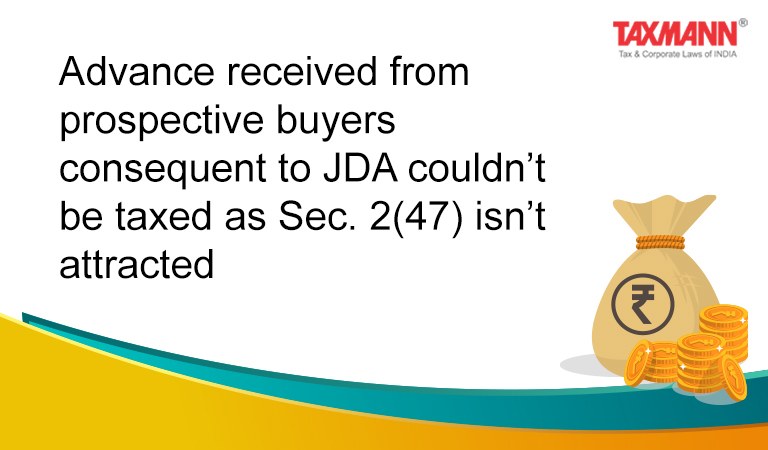Advance received from prospective buyers consequent to JDA couldn’t be taxed as Sec. 2(47) isn’t attracted
- Blog|News|Income Tax|
- 3 Min Read
- By Taxmann
- |
- Last Updated on 25 November, 2022

Case Details: ACIT v. Sri Mathikere Ramaiah Seetharam Gokula House - [2022] 145 taxmann.com 123 (Bangalore-Trib.)
Judiciary and Counsel Details
-
- Smt. Beena Pillai, Judicial Member & Chandra Poojari, Accountant Member
- H. Nagin Khincha & Smt. Suman Lunkar for the Appellant.
- M. Mathivanan for the Respondent.
Facts of the Case
Assessee-individual entered into a Joint Development Agreement (JDA) with the developer for the development and construction of the residential building on the land.
The property developed was being sold in form of an apartment. Each apartment was sold to a prospective customer with an agreement to sell. During the year under consideration, the assessee received an advance from the prospective buyers however, no sales were registered.
The Assessing Officer (AO) held there was the transfer of significant risks and rewards by way of agreement to sell and agreement to construct signifying the applicability of AS-9. Thus, advances received against the sale of flats resulted in the transfer of flats and income was to be recognized.
AO further contended that the builder was regularly accounting for the revenue generated from development as per the percentage completion method under AS-7.
Aggrieved by the order of AO, an appeal was filed to CIT (A). The preferred appeal was allowed by the CIT(A). Aggrieved-AO preferred an appeal to Bangalore Tribunal.
ITAT Held
The Tribunal held that the provisions of deemed transfer under section 2(47)(v) could not have been invoked even if the assessee received the advances consequent to the development agreement Unless and until a debt is created in favour of the assessee by somebody, it cannot be said that he has acquired a right to receive the income or that income, as accrued to him.
In the given case, the assessee didn’t give any possession of the flat to prospective buyers. The purchasers also do not have a right to obstruct development. Further, if the prospective purchases do not make the payments, the agreement can be terminated.
The clauses in the agreements with customers confirm that the owner shall retain legal possession, domain, and control over the property till the same is developed and sold either in whole or in parts to prospective purchasers.
Section 2(47) lays down the provision for deemed transfer, allowing possession of the immovable property to be taken or retained in part performance of the contract as referred to in section 53A of the Transfer Property Act.
Section 53A is related to the transfer of immovable property that emphasizes the “performance or willingness to perform his part of the contract” by the buyer (developer in this case) in consideration of the transfer of immovable property. Therefore, section 2(47) will not be applicable as possession is not transferred by way of the development agreement and valid consideration is not received by the assessee.
In the instant case, the construction activity was conducted by the developer and not the assessee, thus the constructed area was not transferred by the assessee to the prospective buyers. The amount received from the buyers is advance and not an amount received towards the absolute transfer of the price of flats. The amount received by the assessee is the revenue derived from the sale of an undivided share of land.
Further, the Tribunal relied upon the Guidance Note on accounting for real estate transactions (Revised) 2012 stating that following the percentage completion method would be incorrect as revenue should not be recognized till the time the legal title is validly transferred to the buyer.
Therefore, the assessee has rightly offered the income to tax in the year in which the flats were sold to ultimate buyers. Thus, the appeal of the AO stands dismissed.
Disclaimer: The content/information published on the website is only for general information of the user and shall not be construed as legal advice. While the Taxmann has exercised reasonable efforts to ensure the veracity of information/content published, Taxmann shall be under no liability in any manner whatsoever for incorrect information, if any.

Taxmann Publications has a dedicated in-house Research & Editorial Team. This team consists of a team of Chartered Accountants, Company Secretaries, and Lawyers. This team works under the guidance and supervision of editor-in-chief Mr Rakesh Bhargava.
The Research and Editorial Team is responsible for developing reliable and accurate content for the readers. The team follows the six-sigma approach to achieve the benchmark of zero error in its publications and research platforms. The team ensures that the following publication guidelines are thoroughly followed while developing the content:
- The statutory material is obtained only from the authorized and reliable sources
- All the latest developments in the judicial and legislative fields are covered
- Prepare the analytical write-ups on current, controversial, and important issues to help the readers to understand the concept and its implications
- Every content published by Taxmann is complete, accurate and lucid
- All evidence-based statements are supported with proper reference to Section, Circular No., Notification No. or citations
- The golden rules of grammar, style and consistency are thoroughly followed
- Font and size that’s easy to read and remain consistent across all imprint and digital publications are applied



 CA | CS | CMA
CA | CS | CMA
